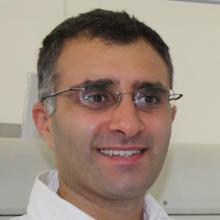Member Spotlight: Gianluca Esposito
Professor of Child Development and Chair of the Ph.D. Program in Cognitive Science, University of Trento, Italy; Co-Chair of the SRCD Nomination Committee; Co-Chair of the Biennial Meeting Review Panel Neuroscience; Chair International Affairs Committee (2019-21); Co-Chairs International Affairs Committee (2017-21), Co-Chairs Review Panel Developmental Disabilities Biennial Meeting (2017 & 2019); Task Force SRCD in the 21st Century 2017-18.
Do you have a mentor or mentors who have been instrumental to your career and, if so, who and how?
I feel I have been blessed to work and collaborate with many great mentors. The list of people that have influenced me is probably too long to fit here, so I will only list a few of them: Paola (Venuti) was my MA and Ph.D. supervisor at the University of Trento (Italy), she taught me that you can only try to look at things unbiasedly if you keep well in mind who you are and where you come from. Marc (Bornstein). . . well the list of things I learned from Marc can probably fill a book. Probably the most important lessons are: (i) friendship always comes first and (ii) that science should be shared and be useful. Philip (Teitelbaum) was my mentor while I was a visiting graduate student at the University of Florida (USA). He thought me that science should be fun, otherwise, it is not worth it. Philip was also the person that urged me to look beyond a single scientific paradigm and integrate knowledge from different domains (animal models, behavioral observation, genetics, etc.) to (try to) answer fundamental questions. Kumi (Kuroda) at the RIKEN Brain Science Institute (now Center for Brain Science) made me understand how tiny details are often the most important.
What advice would you give to a Grad student beginning their Ph.D. studies in Developmental Science or related?
Be Adventurous! Try something new and do not really worry if you do things differently from others.
What is something you learned in the last month outside of your field?
The importance of unknowledge the complexity of human behavior and employing a multilevel approach to answer fundamental questions.
What is your Best SRCD memory?
SRCD is to me a place where you meet old friends and engage in new discussions. A few years ago, together with Angelo Brandelli-Costa (PUCRS, Brazil), we organized a Special Topic Workshop on: "Connecting Worlds: Studying Child Development in Low Resource Contexts", it was supposed to happen in St-Louis but then, because of Covid-19 it was first postponed and then organized online. We were all living in a strange time and world at that time (not that it is any less strange now) and we did not know what to expect from the online forum. Now we are all used to online conferences and meetings, but at that time it was something new. I remember the pleasure of having a chance to discuss with colleagues from all over the world (after months of social isolation). I also remember that online medium provided the opportunity for colleagues to participate, who would otherwise have not been able to attend these meetings in person, especially those from the Global South. This was especially important to me as I was serving as Chair of the SRCD International Affairs Committee at that time and all my effort in that role was directed at increasing the representation and participation from less represented contexts within SRCD.
What publication or book would you say is a must read in the field (and why)?
One from a completely different field, as it will give you something new to think about, and potentially use in your field.
